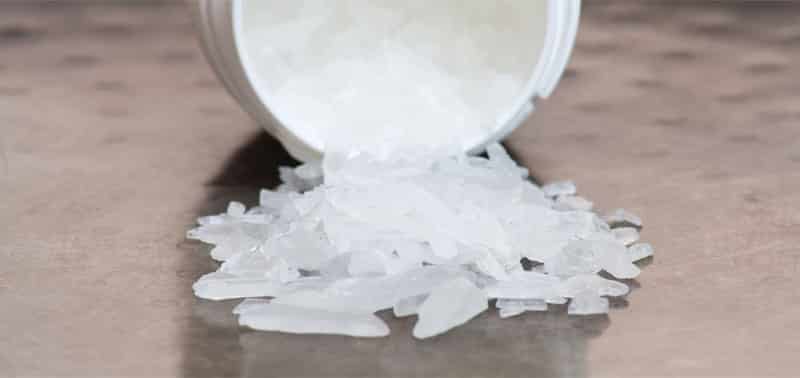Anxiety disorder can occur for a wealth of different reasons, including genetics, caffeine intake, drug use, and more. Oftentimes, anxiety comes as a shock to people the first time they experience it. Anxiety and panic can even feel like a heart attack, stressing people out so much that they go to the hospital for emergency treatment. If you’re using any type of drug, but especially stimulants, anxiety is incredibly common.
What is Meth?
Meth or methamphetamine is a stimulant that increases the levels of dopamine in the brain. Dopamine is associated with pleasure and euphoria. Meth gives users a surge of dopamine, making them want to use the drug over and over again in order to continuously experience that same high. Meth is also referred to as crystal, crank, ice, and speed. Meth may also be laced with other, more dangerous drugs.
Meth isn’t usually the first drug that a drug addict tries, making it much easier for them to develop an addiction. Meth is often used as a last resort when other drugs are packing the potency the addict craves any longer.
Side Effects of Meth Use
There are many severe consequences associated with meth use, and unfortunately, only one of them is anxiety. While anxiety is stressful and can cause a lot of mental anguish, meth can also wreak a lot of havoc on your body. Side effects of meth use include:
- Anxiety and severe depression
- Severe dental decay (meth mouth)
- Itchiness, causing open sores
- Paranoia
- Weight loss
- Hallucinations
The longer that someone uses meth, the more severe these side effects are likely to be. Users will also experience withdrawal symptoms when quitting meth, which is why it’s so hard for people to quit. Withdrawal symptoms include:
- Increased anxiety and depression
- Fatigue
- Agitation
- Increased appetite
- Nausea
- Tremors
- Suicidal thoughts
- Stomach aches
- Dehydration
- Fever
- Hallucinations
Coming off of meth cold turkey can cause a lot of anxiety. This is why it’s so important to work with a treatment facility or doctor while quitting, as they can help to decrease the anxiety that you feel while quitting. Because anxiety is often one of the main reasons people keep using, attending treatment can greatly increase the chance of long-term sobriety.
Types of Anxiety
There are a few different types of anxiety, including Generalized Anxiety Disorder (GAD), Obsessive-Compulsive Disorder (OCD), Panic Disorder, Post-Traumatic Stress Disorder (PTSD), and Social Anxiety Disorder. From meth, most users experience acute anxiety or anxiety that isn’t attached to a specific disorder.
Anxiety as a symptom isn’t necessarily a disorder. However, many drug users may have underlying mental health problems that using drugs uncover. For example, those with PTSD or GAD might use meth as a way to cope with their problems. By using drugs, they don’t have to deal with what’s actually going on in their lives. This is true of a lot of drug users, as addiction often stems from mental illness or experienced trauma.
How Does Meth Cause Anxiety?
Meth is a stimulant, so it causes anxiety in the same way that cocaine and caffeine do. When you consume a stimulant, your heart races and your palms get sweaty. This increase in heart rate can make you anxious or paranoid. If you take too much, you might feel like you’re going to die or that your heart is going to beat right out of your chest. This feeling of panic or impending doom can be hard to deal with in the moment and can cause you to hyperventilate or feel like you can’t breathe at all.
Like we said previously, meth can also cause anxiety as a withdrawal symptom. This happens for the same reason. Your body isn’t producing enough dopamine and you feel paranoid and shaky. You feel like the only thing that will make you feel better is taking more meth. Unfortunately, when dealing with withdrawal symptoms, sometimes you just have to wait it out. If you’re working with a doctor while going through detoxification, they’ll be able to provide support throughout the process, helping you find ways to calm down.
Is Meth Used to Cope with Anxiety?
As we previously stated, many addicts turn to drugs initially as a coping mechanism. Whether they’re using alcohol or meth, drug use is almost always used as a way for people to escape from reality and ignore some problem that they’re facing. In some cases, that problem might be an anxiety disorder, depression, or another mental illness. By using drugs, people don’t have to deal with the actual problem at hand. And while this might seem like a good idea at first, it always backfires. Using drugs will always cause more of a problem in the long run, especially since withdrawing and recovering can be even more difficult mental health-wise.
Treating Anxiety from Meth Addiction
When you have a co-morbid diagnosis like substance use disorder (SUD) and an anxiety disorder of some kind, it’s important to treat them together. If you only treat the substance use disorder and not the root of the problem, you’ll be much more likely to relapse because your anxiety hasn’t gone away. By treating the anxiety as well, you’ll take care of the root problem, making it much easier to move on from your addiction.
That being said, the treatment plans for anxiety and addiction are pretty similar. In both cases, you’ll learn healthy coping mechanisms, trigger avoidance and reduction, and so much more. Anxiety disorders may require additional medications, but it’s up to you and your doctor to decide what works best and is the safest for you, as a recovering addict.
Find a Treatment Center Near You
Struggling with anxiety as a result of meth addiction can be difficult, but we’re here to help you through it. Asheville Recovery Center offers partial hospitalization programs, outpatient treatment, detox referrals, and more. To learn more about our programs and how we can help you get and stay sober, call us today. We’re eager to answer any questions you may have.








